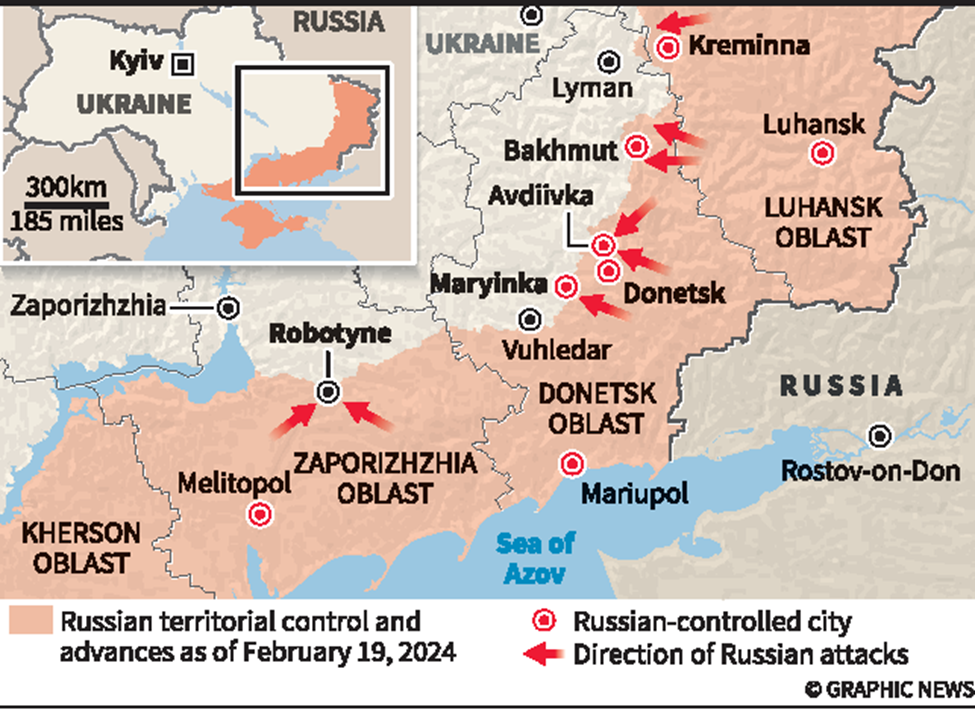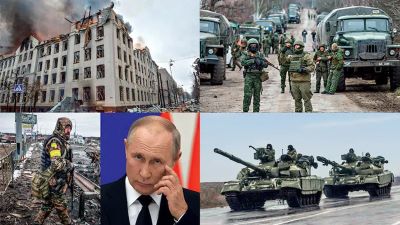Context:
The ongoing war between Russia and Ukraine has not only become one of the most protracted conflicts in recent history but also a significant catalyst for reshaping the global geopolitical landscape. Initially anticipated to be a swift operation, the conflict has evolved into a protracted struggle, fundamentally altering international dynamics. This analysis delves into the multifaceted dimensions of the conflict, exploring its geopolitical implications, the strategies employed by involved parties, and the broader repercussions on global order.

Changing Geopolitical Dynamics:
The war in Ukraine has triggered a notable shift in global power dynamics, with Russia's actions prompting a reevaluation of traditional alliances and strategic interests. The conflict has compelled Russia to pivot towards Asia and the Global South, seeking alternative avenues for economic and strategic cooperation. This strategic realignment underscores the growing complexity of international relations and the emergence of new power centers beyond the traditional Western sphere of influence. Concurrently, the West's steadfast support for Ukraine underscores the enduring significance of geopolitical alliances and the commitment to defend democratic principles in the face of aggression.
Factors Prolonging the Conflict:
Several factors have contributed to the prolonged duration of the conflict, defying initial expectations of a swift resolution. President Vladimir Putin's strategic miscalculation, characterized by underestimating Ukrainian resistance and overestimating Russia's military capabilities, set the stage for a protracted engagement. The West's military assistance and imposition of sanctions further complicated the conflict, denying Russia a decisive victory while bolstering Ukraine's resilience. Moreover, Russia's shift from offensive operations to fortifying defensive positions reflects a recognition of the challenges posed by Ukrainian resistance and international pressure. The failure of Ukraine's counteroffensive underscored the complexities of asymmetric warfare and the limitations of military strategies in resolving deeply entrenched conflicts.
Impacts on Global Balance of Power:
The protracted nature of the conflict has catalyzed a reassessment of the global balance of power, with ramifications extending far beyond the borders of Ukraine. While the West's support for Ukraine and imposition of sanctions aimed to contain Russian aggression, the efficacy of these measures remains subject to debate. Russia's adeptness at circumventing sanctions through alternative economic partnerships and strategic maneuvers highlights the limitations of punitive measures in altering state behavior. Meanwhile, the war has intensified geopolitical competition, with China emerging as a significant beneficiary amidst the stalemate between Russia and the West. As both Russia and the West remain embroiled in Ukraine, China's relative stability and expanding influence position it as a key player in shaping the post-conflict order.
Economic and Strategic Ramifications:
The imposition of sanctions has inflicted significant economic strain on Russia, compelling the country to explore alternative avenues for trade and investment. Despite facing substantial revenue losses, Russia has managed to mitigate the impact through strategic partnerships with non-Western economies and diversification of its economic dependencies. The expansion of defense spending and technological cooperation with countries like China and Iran underscores Russia's resilience in the face of economic adversity. However, the long-term consequences of sanctions and geopolitical isolation pose formidable challenges to Russia's economic stability and global standing. Similarly, Ukraine's military setbacks and economic vulnerabilities underscore the complex interplay between military prowess, economic resilience, and strategic alliances in modern conflict scenarios.
Conclusion:
In conclusion, the war in Ukraine represents a pivotal moment in contemporary geopolitics, reshaping international relations and challenging established power dynamics. As the conflict enters its third year, the endurance of both Russia and Ukraine underscores the complexities of modern warfare and the limitations of military solutions. Moreover, the evolving strategies of involved parties, from economic sanctions to strategic realignments, reflect the multifaceted nature of geopolitical competition in the 21st century. While the immediate implications of the conflict remain uncertain, its long-term repercussions on global stability and order are likely to reverberate for years to come, necessitating a nuanced and collaborative approach to address the underlying causes and consequences of the crisis.
|
Probable Questions for UPSC Mains Exam
|
Source – The Hindu







